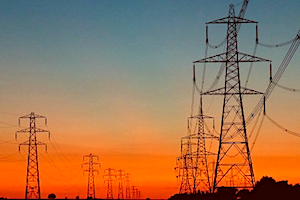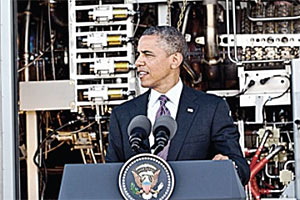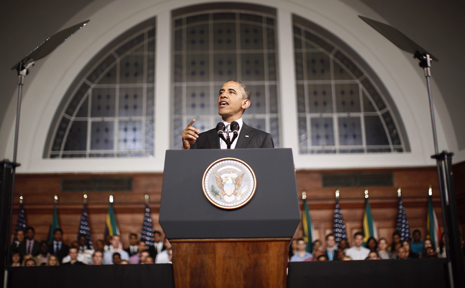US-Africa: A win-win trade and energy agenda to address poverty
As policy makers get ready to attend the upcoming African Growth and Opportunities Act (AGOA) forum hosted by the government of Ethiopia, previous calls to make AGOA effective with robust investments in infrastructure and energy are being answered in Washington DC.
The U.S started its first trade agenda with AGOA in 2000. This act is now being accompanied with a more comprehensive, common sense development agenda, focused on addressing poverty issues in Africa.
For many years, the development policy addressed the symptoms of African problems, but not its root causes. Today, trade, not just aid, is no longer a simple political statement, but one that carries some value to the well-being of a nation.
Africa needs $300 billion to address its energy shortfalls
Substantial investments are being made to harness the untapped wealth of energy resources to aid Africa reach its full potential and earn her place in the global community with the ability to independently lift its people out of the cycle of poverty.
Indeed, no economy, even with the trillions of dollars spent on traditional foreign assistance, can grow without ensuring a consistent and sustainable supply of affordable, environmentally friendly and reliable source of electricity.
President Obama's "Power Africa Initiative" and The Electrify Africa Act of 2013 (HR 2548) are milestone initiatives both aimed at increasing access to electricity in sub-Saharan Africa countries.
The first public private sector partnership covered six African countries including Ethiopia, Ghana, Liberia, Nigeria, Kenya and Tanzania, and the second aims to enhance and expand it to all sub-Saharan African countries, especially in rural and under-served areas.
With these new power initiatives, if properly implemented, Africa will soon have well integrated power systems that will be able to support and maintain its annual GDP growth. Its infrastructure will be built, allowing more investments to flow and African entrepreneurs to reap the benefits of AGOA.
During his recent trip to Africa, President Obama announced his commitment to provide $7bn to his power Africa initiative. Africa needs $300bn to address its energy shortfalls. For this to work, more legislative and long term policies needed to be put in place.
Embracing investment-focused development assistance
At a briefing at Capitol Hill on July 24, 2013, One campaigned for U.S. support for the underlined initiatives and for a new form of "aid" that includes stronger capital and human investment components.
"Africa deserves the same comfort we enjoy in the West. It is a global injustice to witness seven out of ten Africans lacking basic access to electricity," One president, Michael Elliott said.
Elliott also emphasised that the U.S. should learn from its past experiences and avoid the same mistakes made in industrialised nations by ensuring that the cleanest possible technologies are available to generate and distribute power in urban and rural areas.
"Africa is rising, but energy shortage makes it impossible for African economies to sustain and accelerate its economic growth," said Ambassador Cyrille Oguin, who was representing the African diplomatic Corps in Washington DC.
Only 25 percent of the population of Benin has access to electricity. In sub-Saharan Africa access to electricity is pegged at an average of 28 percent, a foster child in comparison to access to power in South East Asia (60 percent) and Latin America (90 percent).
As fortunate as Africa is to have an abundance of natural, environmentally friendly, commercially viable and a diverse energy resources, it has yet to transform those resources into accessible power sources.
Mozambique, has a total reserve of 150tcf of natural gas, second only to Nigeria which has 180tcf of proven natural gas deposit. These resources, however, have yet to be developed.
Africa's continuous challenge in completing projects is due to the lack of necessary capital investments, technical assistance and expertise to extract this wealth of resources from the ground, as well as building supporting infrastructure.
Africa's electrification brings unity in Congress
The Electrify Africa Act 2013 was authored by four members of Congress known for their leadership, commitment to Africa's economic growth and for their ability to reach across the aisle.
On this legislation, Congressman Engel (D-NY) said, "it is not acceptable to see 68 percent of the African population lacking energy in the 21st Century".
On his part, Chairman Royce (R-CA) said, "the challenges African entrepreneurs are facing to benefit from AGOA provisions, especially women, is the access to low cost and clean energy. African entrepreneurs need to be competitive, to produce and export in the global market."
Ranking member Karen Bass (D-CA) passionately shared her experience on seeing children studying with candle lights and women delivering babies with a flash light which compelled her to work in a bipartisan way to pass this legislation.
Chairman Chris Smith (R-NJ) said, "The bill will be transformative in many ways, allowing Africans to refrigerate their food, vaccines and medication, create jobs in Africa, building the needed African manufacturing industry."
This legislation will also complement The Increasing American Jobs Through Greater Exports to Africa Act (HR1777) that was reintroduced with Reps. Bobby Rush and Bass and Senators Durbin and Coons.
Unlocking OPIC's investment potential
Given that OPIC only has 220 staff members with one staff member assigned to the international/Africa office, this number needs to be increased in order to allow them to effectively and efficiently meet set objectives.
As a revenue generator for the government, they will play a key role in these new U.S. power initiatives.
OPIC CEO, Elizabeth L. Littlefield, said that "energy development is one of OPIC's priority for Africa with an average of six percent GDP per annum, there is only one percent growth in its energy capacity, far too low to sustain this growth."
In 2011, OPIC provided $310 million to double the generation capacity of the geothermal power plant project in Kenya from 50 MW to 100MW. They have also committed $1.5 billion in financing the "Power Africa Initiative."
Each dollar invested will create a job in Africa and 1.5 jobs in the U.S.
In response to some concerns raised by environmental groups regarding OPIC's Green House Emission requirements for energy projects, Littlefield clarified that OPIC increased its financing of renewable energy projects from $200 million in 2000 to $ 1.6bn in 2012 as a means of encouraging more clean energy development aimed at meeting global Climate Change commitments.
Complementing and strengthening AGOA
During past AGOA forums, repeated calls were made by the private sector, and civil society, to encourage the development of Africa's infrastructure and power/energy sector.
In a recent poll, 70 percent of African business leaders expressed the lack of electricity as an impediment to their economic growth and the slowing of their potential annual GDP growth rate.
China recently provided $ 3bn in low interest loans for infrastructure development, including $700 million for a hydro power project in Nigeria alone.
It is time for the U.S. to act, and as policy makers consider more concrete solutions to the challenges facing Africa at the August AGOA summit in Addis Ababa, Ethiopia.
How to harness the power of the African private sector in the Diaspora
Littlefield acknowledged that Africans in the Diaspora have been big investors in Africa.
Indeed, records show that they have a combined proven financial capacity estimated at over $60bn annually transferred to the continent, much more than the "aid" currently being provided to Africa.
Africans in the Diaspora also have a diverse untapped cultural and linguistic understanding, professional and educational skills and expertise to help transform Africa's future.
If well leveraged, their contribution will be a valuable catalyst in U.S./Africa trade and development discussions.
While the role of Africa's private sector and the Diaspora has yet to be defined, this promises to be the game changer in the future of Africa's economic development.
Africa's public sector is often defined in the American perspective, overlooking the fact that African entrepreneurial skills played a central role in today's African renaissance.
South Africa and Nigeria have very dynamic African business leaders who have been active in the energy sector and participate in the global stage, but they remain unrecognised.
Some tax incentives should also be put in place to encourage more U.S. investments in Africa.
To conclude, passage of these legislations will create the partnership that the African and American people are aiming for.
The region's many challenges can be overcome if given the chance.
Angelle B. Kwemo is President of Washington DC-based AStrategiK Group and former United States Congressional Staff.




